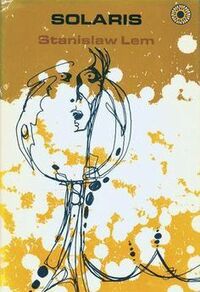You need to sign in or sign up before continuing.
Take a photo of a barcode or cover
This is my first time reading Lem. Been meaning to get around to him for years. Found a handful of his books for my Kindle on Bittorrent so now seemed like the time. Of course I'm a fan, although it's been quite a few years now since the last time I saw it, of the Tarkovsky film. As a matter of fact I can't really remember how I interpreted the mysterious film, if I even tried to put it into words. The master's films are so hypnotic it almost seems like to try to translate them into any other language than that of pure cinematic experience is to betray the overall effect that so few auteurs have managed to achieve.
At any rate, the novel... I believe it was Harlan Ellison who pointed out that the original Star Trek TV series only had the one conceit: The crew of the Enterprise encounter god. While not totally 100% true, it's true enough, and actually goes much broader to define, in my humble opinion, most sci fi. Oh, sure, it's almost always presented as the encounter with another species with superior technology, but as we here on Earth long ago discovered, when our species encounter superior technology, it usually retreats into superstition to cope with the incomprehensible fear such superior power engenders.
Well, this is my take on Solaris the novel. In the final chapter the short discussion of the "flawed god" seems to bring (as others here have noted) the dual elements of the novel together, the narrative of the imposter doubles who appear to the three astronauts, and the long digressions on the history and taxonomy of the Solaris sea and its phenomena. It struck me that the long scientific passages were a parody of both science and, in retrospect, theology as well--the rational human brain's attempt to conceive of and encapsulate an omnipresent superior being. The folly of that resonates, to me, with the narrative of Kelvin's perhaps subconscious murder of his wife and her return--an existential conundrum as he can not change the past or undue the act committed but only try to make the best of living with a physical embodiment of his guilt and shame and try, in human fashion, to somehow make partial amends through love and devotion which he may or may not truly feel. The dual aspects of religion, awe before a higher power and the limits of our own morality and our ability to identify and then abide by that morality's rules, seem to come together in face of humanity's encounter with the living sea of Solaris.
As we might expect from such a narrative, there are no solutions and humanity remains in awe at the end, only with a slight sensation that its trials and tribulations are far from over.
At any rate, the novel... I believe it was Harlan Ellison who pointed out that the original Star Trek TV series only had the one conceit: The crew of the Enterprise encounter god. While not totally 100% true, it's true enough, and actually goes much broader to define, in my humble opinion, most sci fi. Oh, sure, it's almost always presented as the encounter with another species with superior technology, but as we here on Earth long ago discovered, when our species encounter superior technology, it usually retreats into superstition to cope with the incomprehensible fear such superior power engenders.
Well, this is my take on Solaris the novel. In the final chapter the short discussion of the "flawed god" seems to bring (as others here have noted) the dual elements of the novel together, the narrative of the imposter doubles who appear to the three astronauts, and the long digressions on the history and taxonomy of the Solaris sea and its phenomena. It struck me that the long scientific passages were a parody of both science and, in retrospect, theology as well--the rational human brain's attempt to conceive of and encapsulate an omnipresent superior being. The folly of that resonates, to me, with the narrative of Kelvin's perhaps subconscious murder of his wife and her return--an existential conundrum as he can not change the past or undue the act committed but only try to make the best of living with a physical embodiment of his guilt and shame and try, in human fashion, to somehow make partial amends through love and devotion which he may or may not truly feel. The dual aspects of religion, awe before a higher power and the limits of our own morality and our ability to identify and then abide by that morality's rules, seem to come together in face of humanity's encounter with the living sea of Solaris.
As we might expect from such a narrative, there are no solutions and humanity remains in awe at the end, only with a slight sensation that its trials and tribulations are far from over.
I initially thought this book was all sci-fi until about 3/4 of the way through and it turned into philosophy, even religion, and a breakdown of human emotions. Thoughtful! It’s is not a smart ocean or a cruel ocean but a complex ocean.
mysterious
reflective
tense
slow-paced
Plot or Character Driven:
Character
Strong character development:
Yes
Loveable characters:
No
Diverse cast of characters:
No
Flaws of characters a main focus:
Yes
adventurous
challenging
emotional
mysterious
reflective
relaxing
sad
medium-paced
Plot or Character Driven:
A mix
Strong character development:
No
Loveable characters:
Complicated
Diverse cast of characters:
No
Flaws of characters a main focus:
Yes
It is an interesting book, and thought provoking to a certain extent. There are elements that have clearly influenced other scifi. It is mind altering in a similar "aliens could be weird beyond our common imagining" way as blindsight in my opinion. Not the specifics but the result.
I do think the hype around the book made me anticipate more, but definitely would recommend it. It is a great story, and journey as a reader, that I think does affect you in a fundamental way.
I do think the hype around the book made me anticipate more, but definitely would recommend it. It is a great story, and journey as a reader, that I think does affect you in a fundamental way.
Graphic: Suicide
adventurous
challenging
dark
reflective
sad
fast-paced
Plot or Character Driven:
A mix
Strong character development:
Yes
Loveable characters:
Complicated
Diverse cast of characters:
Yes
Flaws of characters a main focus:
Yes
An epical novel from futurist author Stanislaw Lem. The book is full of details and reminds from its style on Andy Weir, but adds a fascinating love story.
challenging
dark
emotional
hopeful
mysterious
sad
tense
slow-paced
Plot or Character Driven:
Character
challenging
dark
emotional
mysterious
reflective
sad
tense
medium-paced
Plot or Character Driven:
A mix
Strong character development:
Complicated
Loveable characters:
Complicated
Diverse cast of characters:
No
Flaws of characters a main focus:
Yes
Este es sin duda uno de los libros mas profundos, difíciles y extraños que he leído, pero también uno con una planteamiento diferente, ciencia ficción de pura cepa y que se merece su lugar en los clásicos de este género, por diferente, por que su planteamiento de vida extraterrestre, de primer contacto, de inteligencia artificial y de las relaciones humanas es tan diferente a lo conocido que lo convierte en algo digno de leerse.
Por una parte es un libro puro de Ciencia Ficción, de los llamados de primer contacto, es decir, de esos que hablan de contacto con seres extraterrestres, pero no se piensen que en eso es un libro común, porque dicho contacto no es usual o no el que siempre se plantea en este tipo de libros.
Pero por otro lado, este libro es también de orden psicológico y filosófico, de la manera en que los habitantes de Solaris luchan con sus propios demonios, con sus cosas de alma de lo que han vivido y ahora solaris les hace enfrentar ¿qué es verdad y que es mentira? ¿es acaso un experimento? ¿es una tortura psicológica o simplemente un regalo del planeta al alma torturada de cada uno de los habitantes de solaris? Un planteamiento de reflexión pura y dura y donde Kelvin, nuestro narrador es quien nos hace dichas reflexiones.
Por una parte es un libro puro de Ciencia Ficción, de los llamados de primer contacto, es decir, de esos que hablan de contacto con seres extraterrestres, pero no se piensen que en eso es un libro común, porque dicho contacto no es usual o no el que siempre se plantea en este tipo de libros.
Pero por otro lado, este libro es también de orden psicológico y filosófico, de la manera en que los habitantes de Solaris luchan con sus propios demonios, con sus cosas de alma de lo que han vivido y ahora solaris les hace enfrentar ¿qué es verdad y que es mentira? ¿es acaso un experimento? ¿es una tortura psicológica o simplemente un regalo del planeta al alma torturada de cada uno de los habitantes de solaris? Un planteamiento de reflexión pura y dura y donde Kelvin, nuestro narrador es quien nos hace dichas reflexiones.
Strong beginning and amazing sci-fi concepts but what the hell happened to the writing style in the last third?? It drastically changed and started sounding like a dissertation that did not move the plot forward at all. I really don't understand that choice - it made me almost angry finishing this book.






